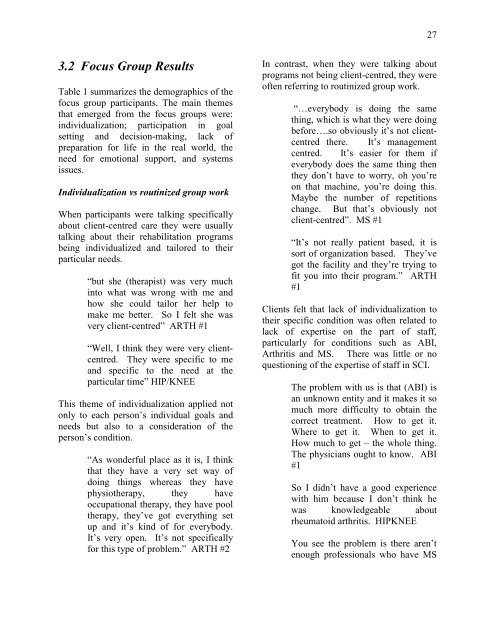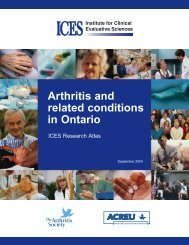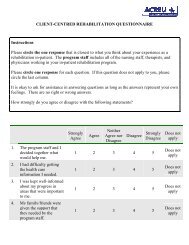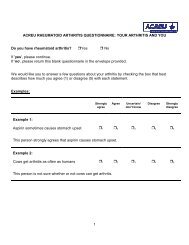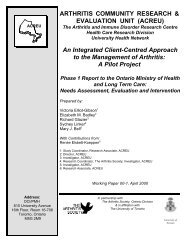Client-Centred Rehabilitation - Arthritis Community Research ...
Client-Centred Rehabilitation - Arthritis Community Research ...
Client-Centred Rehabilitation - Arthritis Community Research ...
You also want an ePaper? Increase the reach of your titles
YUMPU automatically turns print PDFs into web optimized ePapers that Google loves.
27<br />
3.2 Focus Group Results<br />
Table 1 summarizes the demographics of the<br />
focus group participants. The main themes<br />
that emerged from the focus groups were:<br />
individualization; participation in goal<br />
setting and decision-making, lack of<br />
preparation for life in the real world, the<br />
need for emotional support, and systems<br />
issues.<br />
Individualization vs routinized group work<br />
When participants were talking specifically<br />
about client-centred care they were usually<br />
talking about their rehabilitation programs<br />
being individualized and tailored to their<br />
particular needs.<br />
“but she (therapist) was very much<br />
into what was wrong with me and<br />
how she could tailor her help to<br />
make me better. So I felt she was<br />
very client-centred” ARTH #1<br />
“Well, I think they were very clientcentred.<br />
They were specific to me<br />
and specific to the need at the<br />
particular time” HIP/KNEE<br />
This theme of individualization applied not<br />
only to each person’s individual goals and<br />
needs but also to a consideration of the<br />
person’s condition.<br />
“As wonderful place as it is, I think<br />
that they have a very set way of<br />
doing things whereas they have<br />
physiotherapy, they have<br />
occupational therapy, they have pool<br />
therapy, they’ve got everything set<br />
up and it’s kind of for everybody.<br />
It’s very open. It’s not specifically<br />
for this type of problem.” ARTH #2<br />
In contrast, when they were talking about<br />
programs not being client-centred, they were<br />
often referring to routinized group work.<br />
“…everybody is doing the same<br />
thing, which is what they were doing<br />
before….so obviously it’s not clientcentred<br />
there. It’s management<br />
centred. It’s easier for them if<br />
everybody does the same thing then<br />
they don’t have to worry, oh you’re<br />
on that machine, you’re doing this.<br />
Maybe the number of repetitions<br />
change. But that’s obviously not<br />
client-centred”. MS #1<br />
“It’s not really patient based, it is<br />
sort of organization based. They’ve<br />
got the facility and they’re trying to<br />
fit you into their program.” ARTH<br />
#1<br />
<strong>Client</strong>s felt that lack of individualization to<br />
their specific condition was often related to<br />
lack of expertise on the part of staff,<br />
particularly for conditions such as ABI,<br />
<strong>Arthritis</strong> and MS. There was little or no<br />
questioning of the expertise of staff in SCI.<br />
The problem with us is that (ABI) is<br />
an unknown entity and it makes it so<br />
much more difficulty to obtain the<br />
correct treatment. How to get it.<br />
Where to get it. When to get it.<br />
How much to get – the whole thing.<br />
The physicians ought to know. ABI<br />
#1<br />
So I didn’t have a good experience<br />
with him because I don’t think he<br />
was knowledgeable about<br />
rheumatoid arthritis. HIPKNEE<br />
You see the problem is there aren’t<br />
enough professionals who have MS


